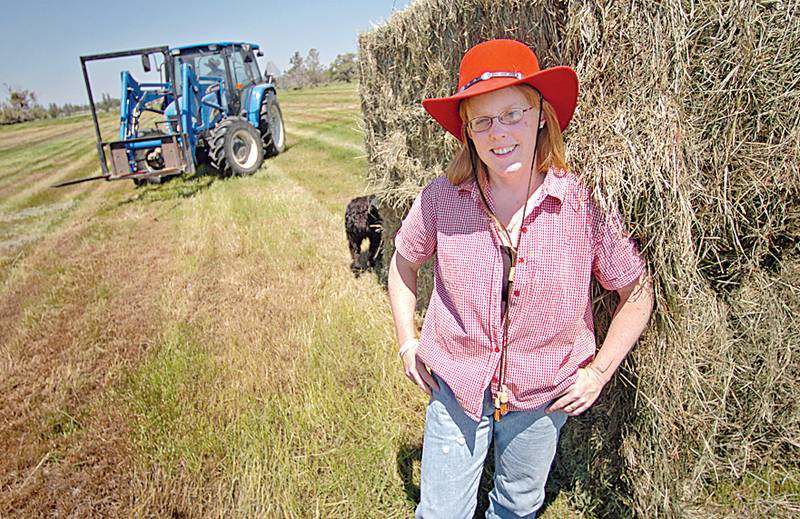From quiet rancher to unlikely anti-resort activist
Published 5:00 am Monday, July 14, 2008

- Powell Butte rancher Mollie Eder, 51, said she never planned to get involved in local government but now thinks she might run for office.
POWELL BUTTE — It’s easy to drive past Mollie Eder’s ranch without noticing the hand-painted sign at the end of the driveway.
Against a backdrop of wide-open pastures dotted with cattle, horses and stacks of hay, the white sign with green letters reading “stop resort growth” is a quiet, unobtrusive symbol of resistance — and a symbol of the effort that has turned Eder, an equally quiet, unassuming rancher, into an unlikely force in local land use politics.
A year ago, the petite redhead wasn’t particularly interested or involved in local politics. She wasn’t a regular at county meetings or a go-to source when neighbors had questions about community planning or state law.
And when destination resorts began to move into her agricultural community — first Brasada Ranch, then Remington Ranch and Hidden Canyon — Eder kept quiet, even though she didn’t agree with all of the growth.
But when developers of a fourth resort, Crossing Trails, set their sights on a 580-acre parcel adjacent to the ranch she bought with her husband, Gary, nearly a decade ago, Eder started paying attention.
At meetings of the Concerned Citizens of Crook County, a community anti-resort group, she began speaking up. And as the months went by and others got busy with work and family obligations, Eder, 51, decided to do something unprecedented in the state of Oregon: draft a ballot measure that would ask county officials to repeal the destination resort overlay map, making additional development impossible.
With the help of a small group of volunteers who gathered signatures in front of grocery stores and went door-to-door asking neighbors for support, Eder’s measure made it on the May primary ballot. A few months later, the measure was overwhelmingly passed by Crook County voters — due in no small part to its author’s quiet political style, according to her friends and neighbors.
“Mollie’s a logical candidate to lead this — she’s passionate, but she’s respectful. She can say things that are straight without offending people,” said Dr. Hayden Sears, a Mapleton veterinarian who lives near the Eders for part of the year. “When you’re dealing with trying to unite people and make change, you have to do it in a kind and respectful way, and you can’t be abrasive. You have to respect people’s thoughts, and that’s a hard ticket. But she can do it.”
An unlikely activist
Growing up just outside of Portland, Eder never expected she’d be the kind of woman who would spend her time raising animals and hay — or fighting to protect that lifestyle. After graduating from Portland State University with a degree in cartography, Eder worked at Portland General Electric, mapping electrical systems for cities and towns. But when she met and married Gary, a rancher, in the late 1980s, the city girl traded in the bright lights for open fields and embraced the agricultural life.
The move to Central Oregon happened about 10 years later, when the Eders passed through on a bicycle trip and fell in love with the area’s climate — and the quiet, agricultural community of Powell Butte. Back then, Eder said, she and her husband weren’t overly concerned that the area would change quickly.
But looking back, she said she now understands that there was always a chance that the secret would get out, and Powell Butte would become a more popular destination. “Of course, one small factor in why we moved here is that it’s close to Redmond, not that far from Bend … but for that very same reason, this is a very convenient place (for others) to live, so suddenly, there’s Brasada.”
As the community became a hot destination for resort developers, Eder said she and most of her neighbors were slow to react. While she kept busy with the ranch, her work as a hospice volunteer and as a leader of the Northwest Regional Spinners Association, a craft group, the three resorts were approved to bring hundreds of housing units, golf courses and other large-scale amenities to Powell Butte.
By last summer, however, Eder had added another activity to her busy schedule — community activism. She began calling friends, neighbors and land use groups. She traveled to Salem to lobby politicians and wrote letters to county officials. The small group of like-minded Powell Butte residents was growing, but by winter, some worried that no one was listening. Though some of her neighbors were throwing around the idea of recalling county officials, Eder decided the group needed to come up with a less aggressive — but equally effective — technique for stopping new resorts.
“We needed something to do, some action that would actually do something,” she said. “If someone else would have started a recall petition, I would have joined in with it. But I didn’t feel comfortable leading a recall myself — it seems too personal. And I’m a nonconfrontational person.”
The measure
In the end, Eder decided to write her own ballot measure, one that would advise county officials to stop new development by getting rid of the map needed to locate new resorts. She said she liked the idea of a measure because it was about the votes of many people — not about one person demanding to be heard.
“I remember in grade school, they taught us the Oregon system — recall, referendum and initiative,” she said. “And I thought, ‘That’s what it’s for — it’s for people who want to see something done.’ … I got the manuals, got the forms, did all that stuff and it wasn’t all that hard, and had about a dozen people willing to collect signatures, and we just did it. Then I felt like I was doing something, making progress. And certainly I was keeping the whole issue in the limelight, which was good.”
With the stroke of a pen — and the signatures of more than 600 supportive Crook County residents — Eder became a leader of the anti-resort movement. It was tough for someone uncomfortable with asking tough questions or demanding change, but Carla Bridges, a rancher and neighbor, said the soft-spoken Eder was ready for the challenge.
“When you feel you’re pushed into a corner, you do things you never in your life thought you’d be doing. … Thankfully she’s been willing to take a (leadership) position, and she’s doing a great job,” Bridges said. “We’re all willing to get behind her.”
Though she received many calls of support, Eder also had to fend off critics who called her a whiny newcomer — including one who drew an unflattering cartoon of her for the local paper.
“I get phone calls from people all over the state, people leaving messages saying, ‘I read about you in the newspaper,’” she said. “And I’m meeting people around here — they’ll just call and say ‘I have a document that might help,’ and they’ll drop it off. … There’s days where I think, ‘All I did all day was talk to people, e-mail people and look up documents, and I’m tired of this and I want to quit.’ But I can’t really quit.”
When voters passed the measure this May, and officials agreed to send the repeal proposal to the Crook County Planning Commission, Eder was ecstatic. But nearly two months later, she said she’s a bit frustrated to see that progress has been slow.
Both Eder and her husband are keeping up the fight, attending county hearings on Crossing Trails resort — which will not be affected by the ballot measure, because the application was processed before the vote — and keeping the pressure on local politicians to see the resort map repeal through.
When she looks out her dining room window at the land that could someday be a resort, concern flickers over Eder’s face. But she’s also quick to smile as she talks about the long process that made a rancher into an activist. This year, Eder was appointed to the county’s budget committee, and she said someday she might consider running for elected office.
Fighting the resorts, she said, has made her a bit more cynical — but also more hopeful about the power of individual people in a democratic society.
“People do respond to an issue that’s important, and it is possible to band together,” she said. “We’ve got so many personalities going here, and yet so far I think we’ve all been able to do our part together or apart, and get our voices heard.”






